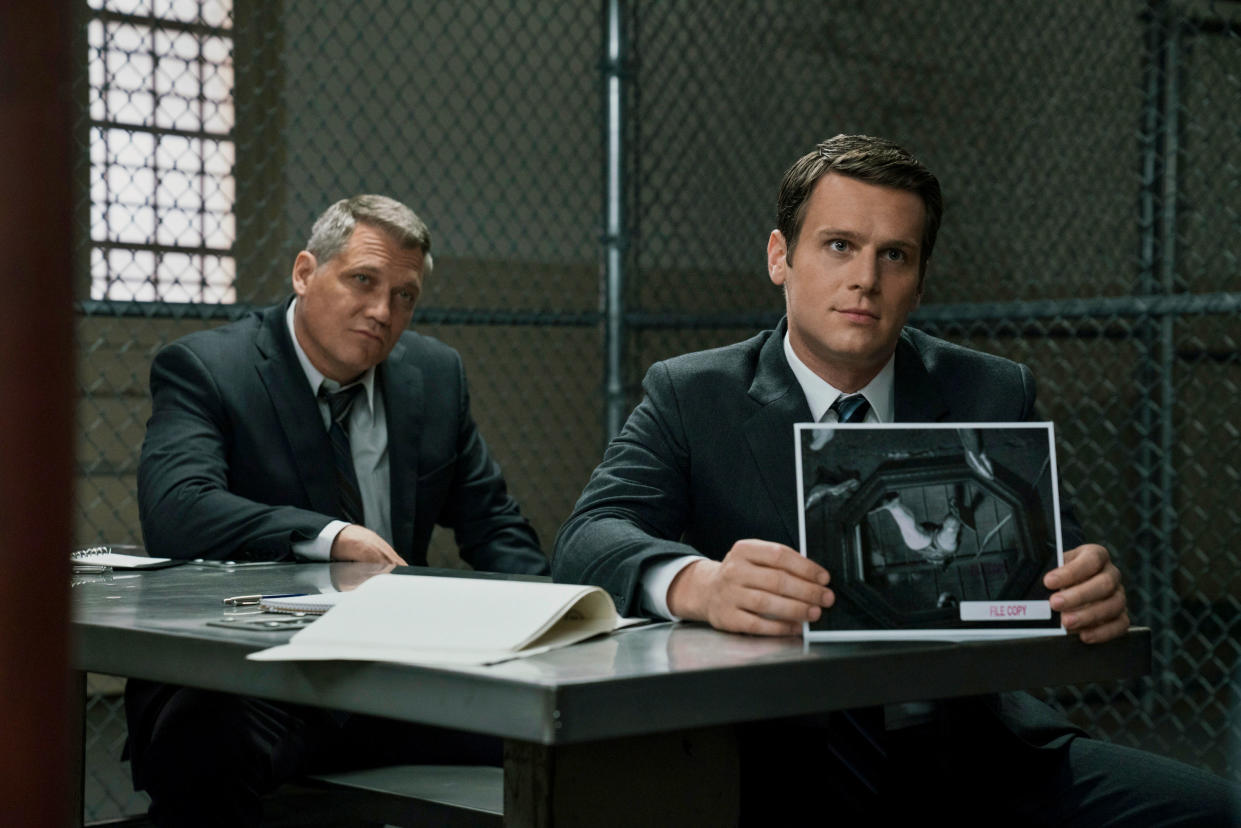'Mindhunter' and the origins of serial-killer entertainment

Have you watched Mindhunter yet? Its 10 episodes are streaming now on Netflix, and it’s one of those TV events you have to watch for yourself, to see where you land on its achievement: Is this exploration of pioneering serial-killer investigators the greatest thing in the genre since Silence of the Lambs, or is it as flat and drab as your average episode of Criminal Minds? Just phrasing it that way gives us a sense of how large the pool of serial-killer entertainment is, and also how recent it is.
If, for example, you looked at movies in the 1940s for entertainment about crafty murderers and the world-weary people who apprehend them, you weren’t watching serial-killer stuff, you were looking at film noir. If you wanted to see movies about aberrant criminal behavior in the 1960s, you went to see Alfred Hitchcock’s Psycho and Michael Powell’s Peeping Tom. As Mindhunter reminds us, the serial-killer business did not set up shop until the ’70s, when, among other people, FBI agent John Douglas began interviewing and profiling murderers who committed multiple killings and drew broad-based conclusions that could help law enforcement identify killers-in-the-making. The Netflix series is based on Douglas’s book Mindhunter: Inside the FBI’s Elite Serial Crime Unit, which he wrote with Mark Olshaker.
The fictionalized version of Mindhunter on Netflix, as conceived by writer Joe Penhall, gives us FBI agents Holden Ford (Jonathan Groff) and Bill Tench (Holt McCallany), two guys — Holden a young, callow rookie, Bill a middle-aged, seen-it-all pro — thrown together who end up forming a tight partnership. The first two episodes are directed by David Fincher, who, in addition to directing hits ranging from Fight Club to Gone Girl, created his own mini-history of the serial-killer biz in 2007’s Zodiac. Fincher sets the visual and tonal template for all the episodes that follow. (He also directed the last two of the 10.) There’s an eerie calm to the atmosphere around Mindhunter — Fincher knows the material he’s dealing with is thrilling enough; he doesn’t have to razzle-dazzle us with arty camera angles or the fast cutting of scenes.
Holden Ford and Bill Tench are buttoned-down FBI agents in white shirts, dark suits, and shiny black shoes. Initially, at least, they do their interviewing in a quietly methodical way. This provides a contrast to their interviewees, such as Ed Kemper, a real-life necrophiliac killer played here in an attention-getting performance by Cameron Britton. A big man with huge hands and a quiet voice, Britton’s Kemper is a highly articulate fellow who speaks with frightening calm about dismembering and engaging in sexual acts with the body parts of his victims. (Note: If you’re the squeamish type, Mindhunter is not big on graphic violence, but the verbal descriptions given during the interrogations are plenty vivid.) Fincher places Britton in the center of the frame, making him hulk impressively over Groff and McCallany — it’s the most generous actor-showcase for a killer since Jonathan Demme revealed Anthony Hopkins’s Oscar-winning performance as Hannibal Lecter in Silence of the Lambs.
As Mindhunter proceeds, Holden and Bill become more distinct personalities. Bill — married, with a troubled young child — becomes worn down and cynical about the process; he worries that they’re giving these criminals too much credit for creativity, stroking their repulsive egos. Holden overcomes his initial timidity and, after a few successful profiles, gradually becomes more confident and ultimately rather arrogant. Indeed, it’s the arc of Holden’s behavior that serves as the clearest narrative development in Manhunter, and since the show has already been renewed for a second season, it will be interesting to see whether Holden becomes too big for his britches and ready for a career fall.
Along the way, the FBI guys work with an academic researcher played by Fringe’s Anna Torv, and Holden has a steady girlfriend played by Hannah Gross. Neither woman is particularly well-drawn. Gross’s Debbie is there largely as someone to whom Holden can reveal his hopes and fears, while Torv’s Dr. Wendy Carr is, much of the time, a loner with a thing for a stray cat that prowls her apartment’s laundry room: yes, she’s a cat lady.
There are structural problems with Mindhunter as well. I mentioned at the start that profiling is a comparatively recent enterprise, but by now, it so permeates pop culture that most of us are minor experts in it. Thus, there’s not much suspense or any thrill of discovery as we watch Holden and Bill slowly tumble to the patterns in serial-killer methodology, and when Holden calls one of the villains a “sequence killer,” we know it’s only a matter of time before someone — Bill, it turns out here — is going to modify that to “serial killer,” and we have to watch as numerous local law-enforcement people listen to the pair as though they’re speaking a foreign language as they expand their vocabularies with terms such as “unsub.” When we as the audience know more than the characters, a certain impatience can seep into our viewing.
That said, Mindhunter is engrossing, and the central performances by Groff and McCallany are highly distinctive and complementary. The whole production has an assurance that’s comforting in the midst of all the unsettling time we spend with depraved law-breakers. If you give Mindhunter a shot, I’d urge you to watch the whole thing, because it really is conceived as one big, long movie. And I’m definitely up for a second season.
Mindhunter is streaming now on Netflix.
Read more from Yahoo Entertainment:


